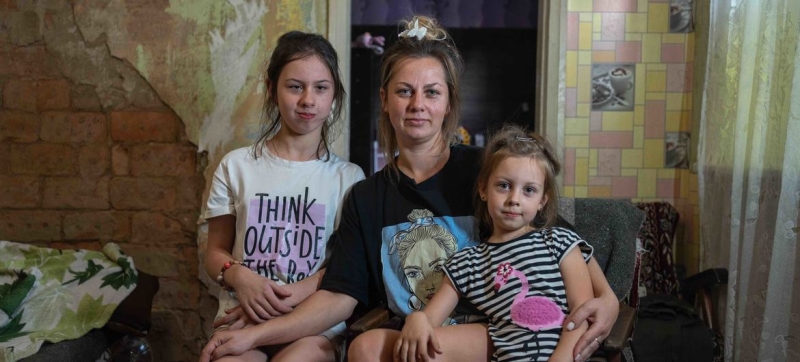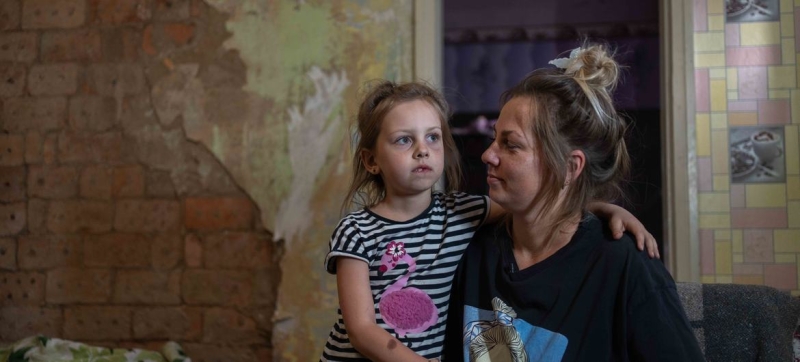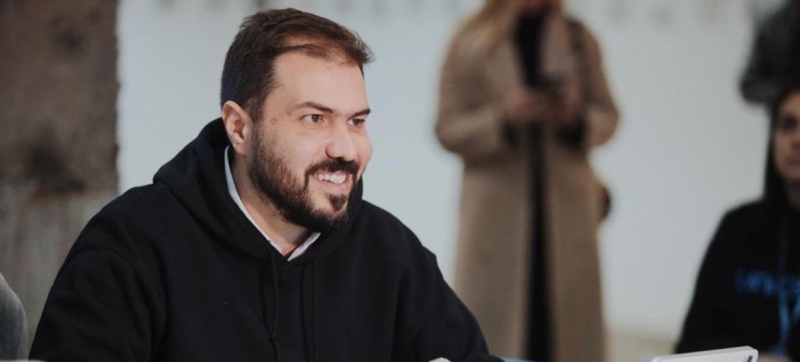
Darya with her daughters Polina and Milana. UNICEF helps young Ukrainians survive the winter Anna Radomskaya Peace and Security
Ukrainians are experiencing another harsh winter. It is especially difficult for those who live in frontline areas – often without electricity, water, heat, under constant shelling. Not everyone wants or can leave their cities and villages, and those who are evacuated often move nearby. About life near the front line, UN assistance and hopes for the future – in the material by Anna Radomskaya from the UN News Service.
Daria’s family evacuated from Mirnograd due to shelling
“There is no light, no connection, no water, only ruins remain. This is no longer a place to live. And certainly not a place for children,” is how 33-year-old Darya describes their native Mirnograd in Donetsk Oblast today. Before the war, it was a mining town with a population of about 50,000 people. Now the front line runs several kilometers from the village, but there are still people there.
Daria’s family decided to leave Mirnograd in the summer, after the city was heavily shelled. The children have not yet recovered from what they experienced. Daria’s daughters, Polina (12) and Milana (7), still flinch at any loud sounds – when a large car drives down the street or a kettle whistles loudly in the kitchen.
“Dad taught us to fall to the ground, open our mouths and cover our ears in the event of shelling”
“There was so much shooting in Mirnograd that even my kindergarten and school were destroyed. Dad taught us to fall to the ground, open our mouths and cover our ears,” Milana says. As a result of the shelling she recalls, a 15-year-old teenager was killed, more than a dozen people were wounded, and many houses were destroyed. It was then that the family made the final decision to evacuate.
They moved nearby – in the same Donetsk region they rented an old house. During the first week in the new place, Darya cried constantly. The housing that the family was able to rent was very different from their home – without the usual comfort, basic amenities. But for the sake of safety, everyone was ready to overcome new difficulties – to repair the house, to prepare it for winter.
“We received help from UNICEF and bought some coal”
“We received help from UNICEF and bought some coal,” says Darya. “For the same money, we bought materials to repair the house and a large 500-liter tank. There is a problem with water here, and now we can make a reserve to bathe the children and wash dishes.”
It was here, after the evacuation, that Darya’s family met with Kenan Madi, head of humanitarian programs for the Ukrainian office of the UN Children’s Fund. He organizes the work of UNICEF field offices in different regions of Ukraine and knows personally what problems people face right up to the front line.
“Last week I was in Donetsk region and I had a chance to meet Darya and her wonderful daughters. This family really wanted to stay at home and stayed there until the very end, until the front line got too close. They had to leave all their things there. And now they have rented a house near Kramatorsk. I visited them there and was happy that thanks to our timely financial assistance they were able to prepare for winter in time. Now their rented house is warm and suitable for children to live there. I was very happy about that!” – shared the UN News Service source.

Daria with her daughter Milana.
More than one million people live in the frontline zone
According to Kenan Madi, more than a million people, including about 150 thousand children, still live in the frontline zone (within the 30-kilometer line).
“I want to point out, and this is important, there are large cities, large settlements within 40 or 50 kilometers,” he says. “I’m talking about Zaporizhia, Kharkov, Sumy, which are also very close to the front line. In these three cities alone, perhaps two million people live, if not more. And they are attacked every day. Recently, more than a hundred thousand people were forced to evacuate from Pokrovsk and the surrounding areas. So, it’s very important not only to pay attention to what’s happening within 30 kilometers of the front line, but also to remember how people live in the large cities. We need to make sure that the population there has the means to survive in the winter, and that the children have everything they need to live a normal life, so to speak.”
“Winter in Ukraine is hard in itself. Without electricity and heating it is even more difficult”
“Winter in Ukraine is difficult in itself, the air temperature can drop to -15, or even -20 degrees, – Kenan Madi states. – And when there is no electricity, heating, it is even more difficult. Many families cannot afford to buy even winter clothes for children.”
Power outages interrupt the educational process. “Imagine your school is closed – no electricity or internet. And the heating at home is turned off (with temperatures outside at minus ten). All this is happening in many regions of Ukraine. Combined with shelling, this has a negative impact on the mental health of children. It is also very difficult for parents and guardians to see their children go through all this, and they are unable to change the reality,” says the head of humanitarian programs.

Head of Humanitarian Programs of the United Nations Children’s Fund in Ukraine Kenan Madi.
“We provided financial assistance to 45 thousand families”
UNICEF has focused on three main areas of work this winter. The first is direct support for families. “We have provided financial assistance to 45,000 families so far, including those living in the frontline zone (within 30 kilometers of the contact line). In total, we have reached about 150,000 people. We also provide non-food items – solid fuel, winter clothing for children, blankets. We have provided these to seven thousand families (that’s about 22,000 people),” says Kenan Madi.
The second area is supporting social facilities. “We provide financial assistance to 800 schools, we help hospitals – we provide boilers to medical institutions so that they have heating. We have provided critical facilities, such as the water utility, with a large number of generators. Thus, the water supply system continues to operate despite the energy crisis,” says the head of UNICEF humanitarian programs.
The third area is supporting heat supply. “We invest in the infrastructure of the centralized heating system – for example, we provide cogeneration units (a solution that allows using the heat from the generator, which would otherwise simply be thrown into the air – editor’s note),” explains Kenan Madi. “To be honest, we are very proud of our work to prepare for winter, because it started on time, and we were able to provide timely support to the population.”
UNICEF field offices operate throughout Ukraine
UNICEF field offices operate in different regions of Ukraine. “One of our offices is in Lviv and is responsible for work in the west of the country. One is in Poltava, it is responsible for work in the central region. But our largest operations are in the east and south. If you look at our humanitarian plan 2025 “Humanitarian Action for Children”, you will see that about 75 percent of the efforts will be concentrated in the eastern and southern regions, where humanitarian needs are higher than anywhere else. For this, we have field offices in Kharkiv, Dnipro, Odessa and a satellite office in Mykolaiv,” said the head of humanitarian programs.
“I see how strong they are. People give me hope for the future”
“70 percent of my time I am “in the field”. I visit our teams on the ground in various regions (from Donetsk, Zaporizhia, Kharkiv, Sumy to Odessa, Kherson, Lviv), I visit frontline areas within 10-20 kilometers from the front line – to check how the work is going, how cooperation with local authorities is established. Often I meet with the families themselves, which gives me the opportunity to understand their needs and how we can help them. And also, when I communicate with these families, it gives me hope. I see how resilient they are, how strong they are. Despite the difficulties, the struggle, despite everything they have to go through, no one wants to leave home. On the contrary, everyone dreams of staying. These people give me hope for the future, ”says Kenan Madi.
